GDPR and Blacklisting: A Case Study of Employee Rights in the UK
VerifiedAdded on 2023/06/18
|10
|2787
|496
Case Study
AI Summary
This case study examines the practice of blacklisting employees in UK construction companies, highlighting its impact on employee rights and freedom of association. It delves into the illegality of blacklisting, referencing relevant legislation like the Data Protection Act and the Human Rights Act, and justifies this stance using the Human Relations Approach theory. The report further discusses the General Data Protection Regulation (GDPR) and how it should modify data management practices to protect employee data, including potential fines for mismanaging employee data. It also analyzes contemporary employment relations developments, reward management issues, and proposes appropriate employee relations and reward practices within the given context of the UK construction industry.
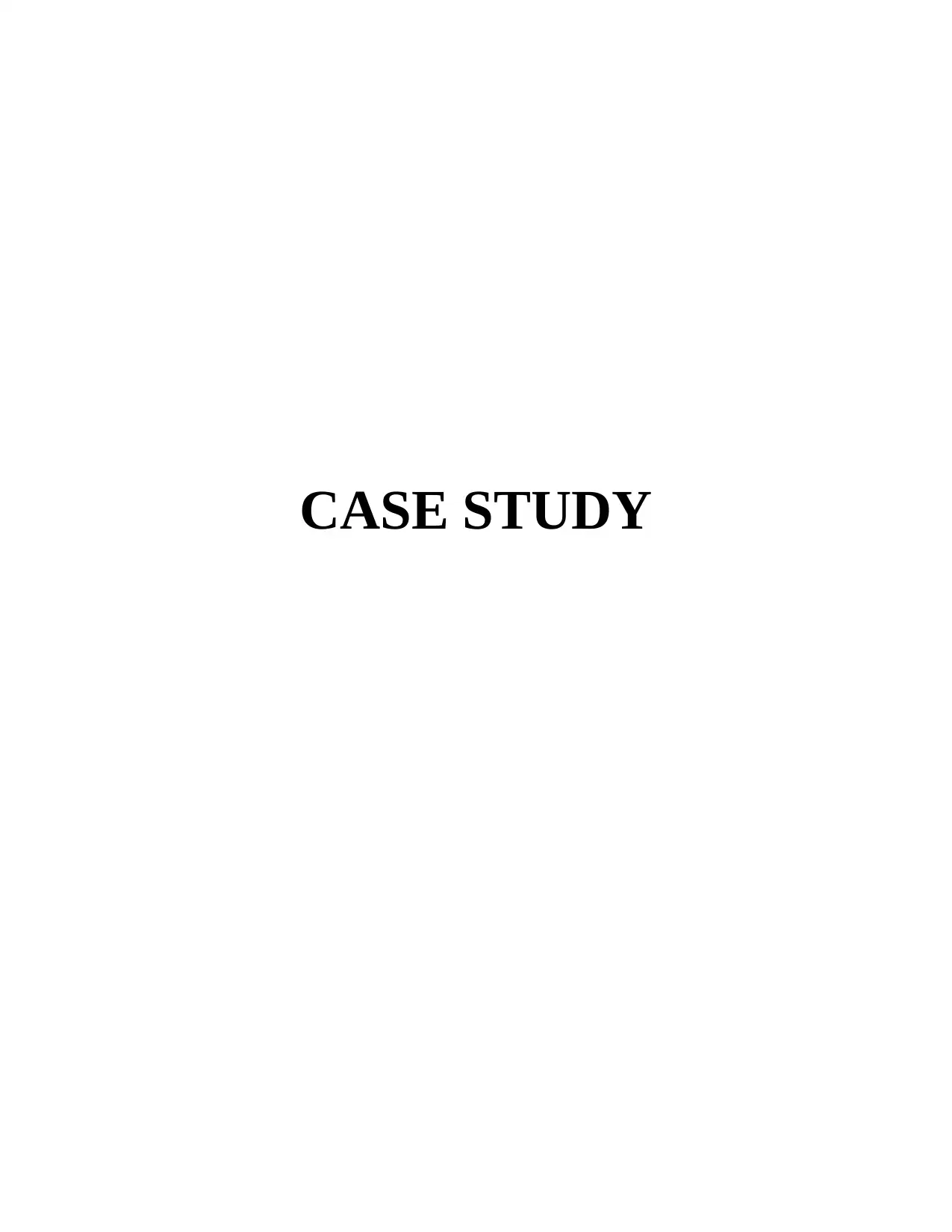
CASE STUDY
Paraphrase This Document
Need a fresh take? Get an instant paraphrase of this document with our AI Paraphraser
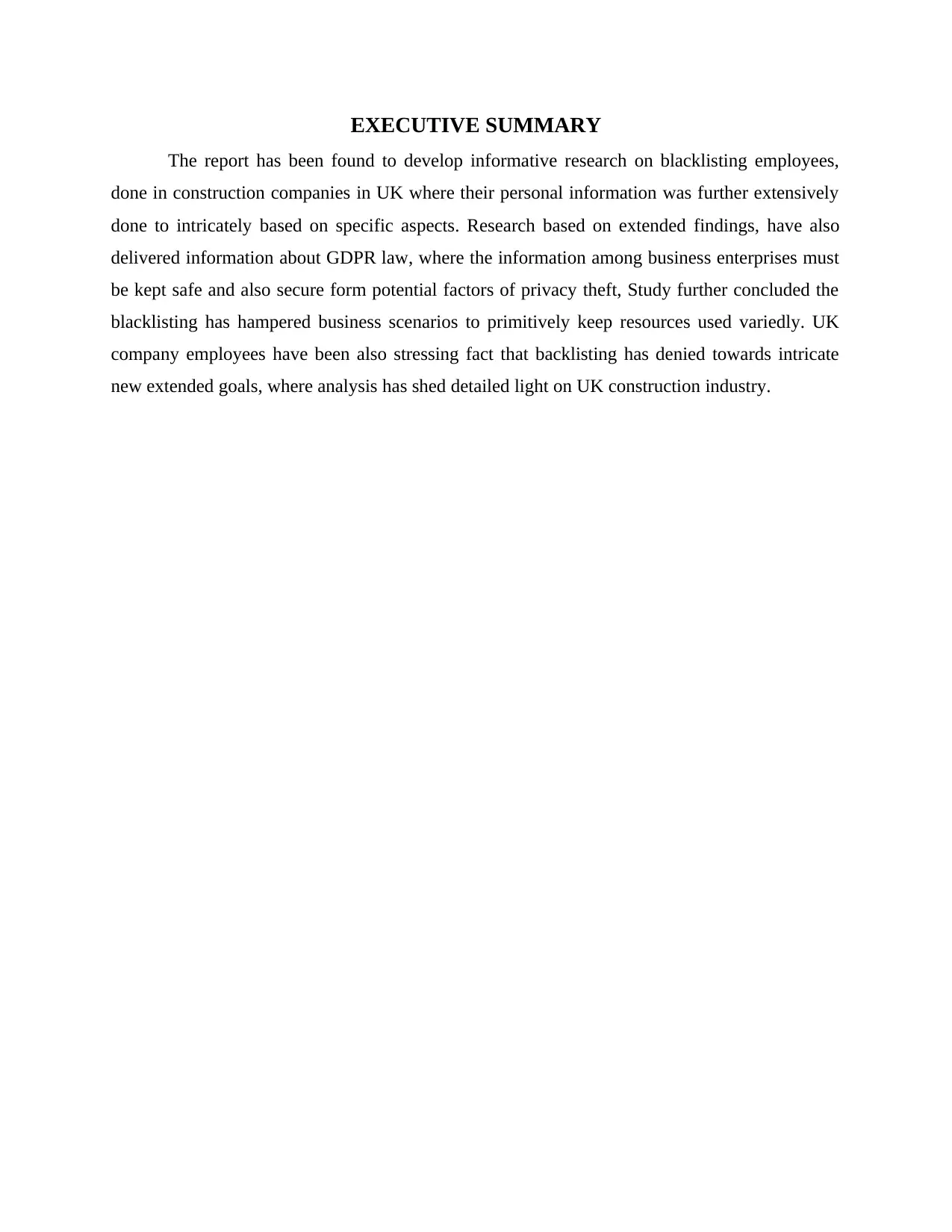
EXECUTIVE SUMMARY
The report has been found to develop informative research on blacklisting employees,
done in construction companies in UK where their personal information was further extensively
done to intricately based on specific aspects. Research based on extended findings, have also
delivered information about GDPR law, where the information among business enterprises must
be kept safe and also secure form potential factors of privacy theft, Study further concluded the
blacklisting has hampered business scenarios to primitively keep resources used variedly. UK
company employees have been also stressing fact that backlisting has denied towards intricate
new extended goals, where analysis has shed detailed light on UK construction industry.
The report has been found to develop informative research on blacklisting employees,
done in construction companies in UK where their personal information was further extensively
done to intricately based on specific aspects. Research based on extended findings, have also
delivered information about GDPR law, where the information among business enterprises must
be kept safe and also secure form potential factors of privacy theft, Study further concluded the
blacklisting has hampered business scenarios to primitively keep resources used variedly. UK
company employees have been also stressing fact that backlisting has denied towards intricate
new extended goals, where analysis has shed detailed light on UK construction industry.
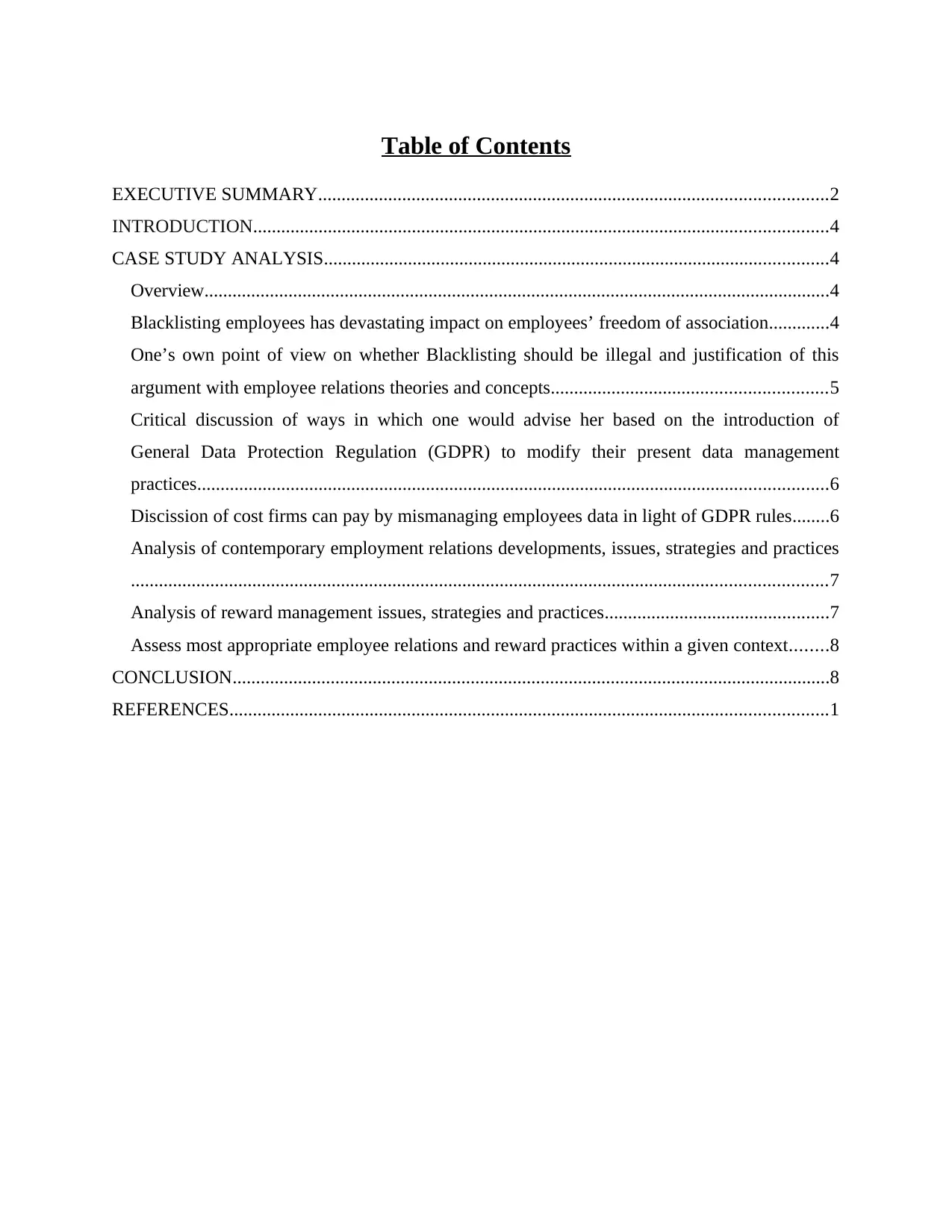
Table of Contents
EXECUTIVE SUMMARY.............................................................................................................2
INTRODUCTION...........................................................................................................................4
CASE STUDY ANALYSIS............................................................................................................4
Overview......................................................................................................................................4
Blacklisting employees has devastating impact on employees’ freedom of association.............4
One’s own point of view on whether Blacklisting should be illegal and justification of this
argument with employee relations theories and concepts...........................................................5
Critical discussion of ways in which one would advise her based on the introduction of
General Data Protection Regulation (GDPR) to modify their present data management
practices.......................................................................................................................................6
Discission of cost firms can pay by mismanaging employees data in light of GDPR rules........6
Analysis of contemporary employment relations developments, issues, strategies and practices
.....................................................................................................................................................7
Analysis of reward management issues, strategies and practices................................................7
Assess most appropriate employee relations and reward practices within a given context........8
CONCLUSION................................................................................................................................8
REFERENCES................................................................................................................................1
EXECUTIVE SUMMARY.............................................................................................................2
INTRODUCTION...........................................................................................................................4
CASE STUDY ANALYSIS............................................................................................................4
Overview......................................................................................................................................4
Blacklisting employees has devastating impact on employees’ freedom of association.............4
One’s own point of view on whether Blacklisting should be illegal and justification of this
argument with employee relations theories and concepts...........................................................5
Critical discussion of ways in which one would advise her based on the introduction of
General Data Protection Regulation (GDPR) to modify their present data management
practices.......................................................................................................................................6
Discission of cost firms can pay by mismanaging employees data in light of GDPR rules........6
Analysis of contemporary employment relations developments, issues, strategies and practices
.....................................................................................................................................................7
Analysis of reward management issues, strategies and practices................................................7
Assess most appropriate employee relations and reward practices within a given context........8
CONCLUSION................................................................................................................................8
REFERENCES................................................................................................................................1
⊘ This is a preview!⊘
Do you want full access?
Subscribe today to unlock all pages.

Trusted by 1+ million students worldwide
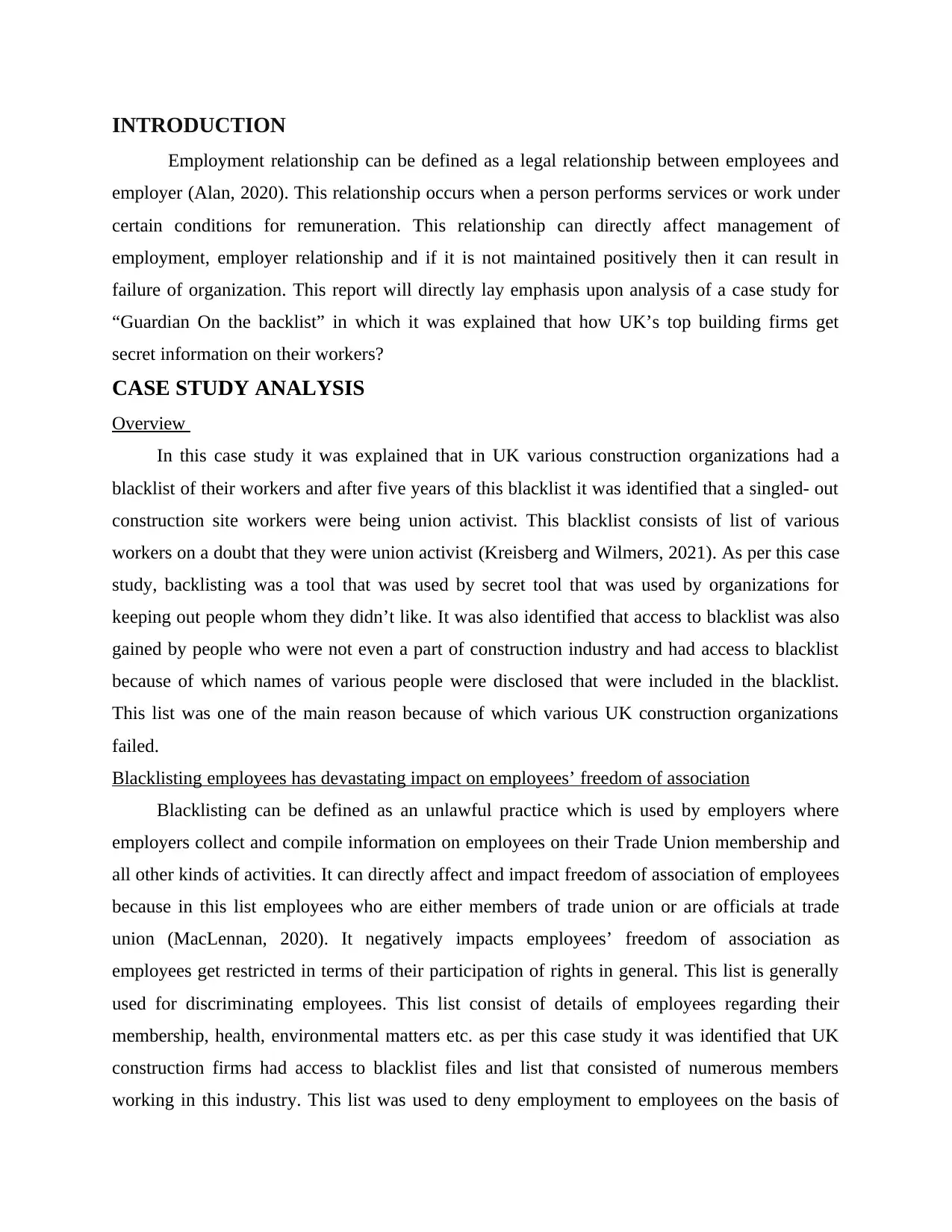
INTRODUCTION
Employment relationship can be defined as a legal relationship between employees and
employer (Alan, 2020). This relationship occurs when a person performs services or work under
certain conditions for remuneration. This relationship can directly affect management of
employment, employer relationship and if it is not maintained positively then it can result in
failure of organization. This report will directly lay emphasis upon analysis of a case study for
“Guardian On the backlist” in which it was explained that how UK’s top building firms get
secret information on their workers?
CASE STUDY ANALYSIS
Overview
In this case study it was explained that in UK various construction organizations had a
blacklist of their workers and after five years of this blacklist it was identified that a singled- out
construction site workers were being union activist. This blacklist consists of list of various
workers on a doubt that they were union activist (Kreisberg and Wilmers, 2021). As per this case
study, backlisting was a tool that was used by secret tool that was used by organizations for
keeping out people whom they didn’t like. It was also identified that access to blacklist was also
gained by people who were not even a part of construction industry and had access to blacklist
because of which names of various people were disclosed that were included in the blacklist.
This list was one of the main reason because of which various UK construction organizations
failed.
Blacklisting employees has devastating impact on employees’ freedom of association
Blacklisting can be defined as an unlawful practice which is used by employers where
employers collect and compile information on employees on their Trade Union membership and
all other kinds of activities. It can directly affect and impact freedom of association of employees
because in this list employees who are either members of trade union or are officials at trade
union (MacLennan, 2020). It negatively impacts employees’ freedom of association as
employees get restricted in terms of their participation of rights in general. This list is generally
used for discriminating employees. This list consist of details of employees regarding their
membership, health, environmental matters etc. as per this case study it was identified that UK
construction firms had access to blacklist files and list that consisted of numerous members
working in this industry. This list was used to deny employment to employees on the basis of
Employment relationship can be defined as a legal relationship between employees and
employer (Alan, 2020). This relationship occurs when a person performs services or work under
certain conditions for remuneration. This relationship can directly affect management of
employment, employer relationship and if it is not maintained positively then it can result in
failure of organization. This report will directly lay emphasis upon analysis of a case study for
“Guardian On the backlist” in which it was explained that how UK’s top building firms get
secret information on their workers?
CASE STUDY ANALYSIS
Overview
In this case study it was explained that in UK various construction organizations had a
blacklist of their workers and after five years of this blacklist it was identified that a singled- out
construction site workers were being union activist. This blacklist consists of list of various
workers on a doubt that they were union activist (Kreisberg and Wilmers, 2021). As per this case
study, backlisting was a tool that was used by secret tool that was used by organizations for
keeping out people whom they didn’t like. It was also identified that access to blacklist was also
gained by people who were not even a part of construction industry and had access to blacklist
because of which names of various people were disclosed that were included in the blacklist.
This list was one of the main reason because of which various UK construction organizations
failed.
Blacklisting employees has devastating impact on employees’ freedom of association
Blacklisting can be defined as an unlawful practice which is used by employers where
employers collect and compile information on employees on their Trade Union membership and
all other kinds of activities. It can directly affect and impact freedom of association of employees
because in this list employees who are either members of trade union or are officials at trade
union (MacLennan, 2020). It negatively impacts employees’ freedom of association as
employees get restricted in terms of their participation of rights in general. This list is generally
used for discriminating employees. This list consist of details of employees regarding their
membership, health, environmental matters etc. as per this case study it was identified that UK
construction firms had access to blacklist files and list that consisted of numerous members
working in this industry. This list was used to deny employment to employees on the basis of
Paraphrase This Document
Need a fresh take? Get an instant paraphrase of this document with our AI Paraphraser
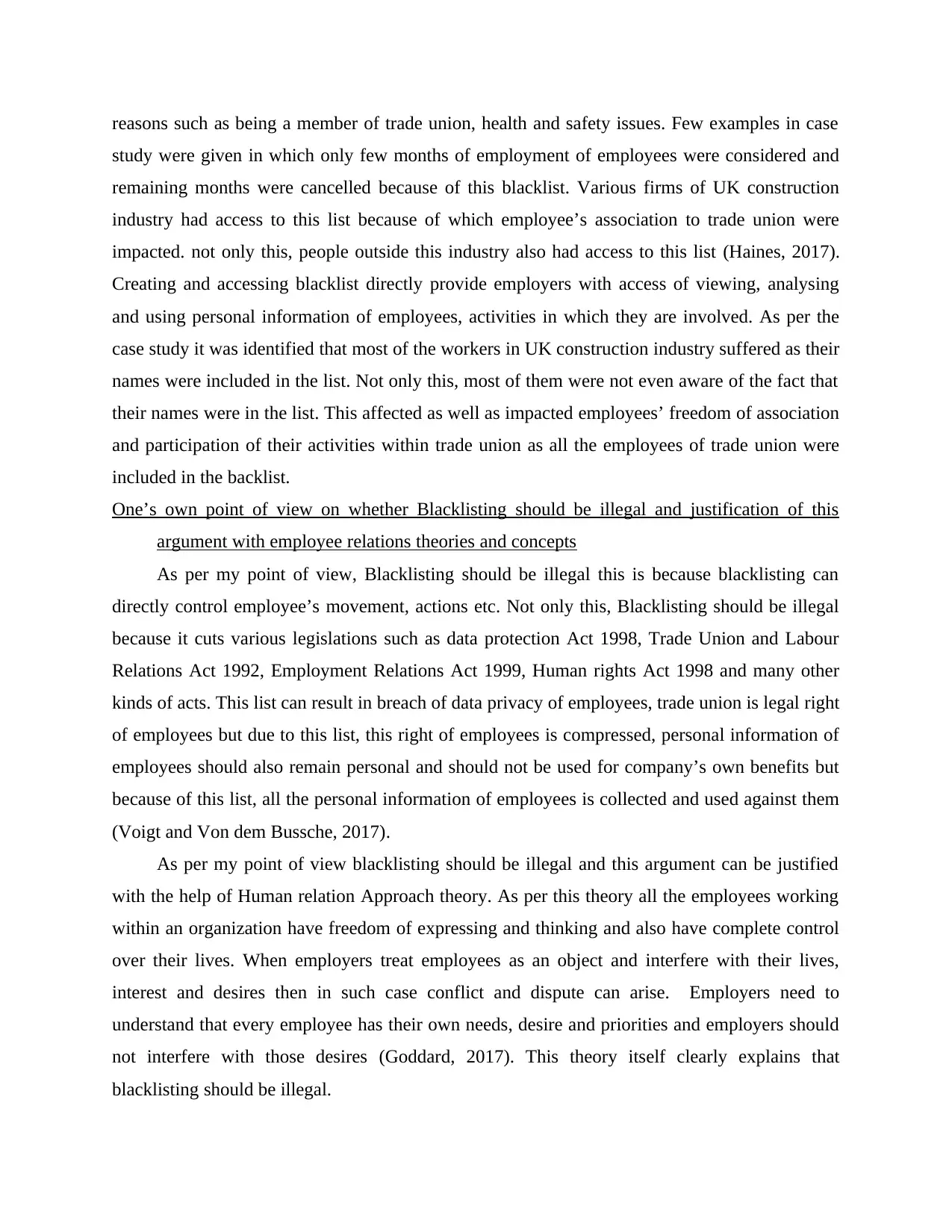
reasons such as being a member of trade union, health and safety issues. Few examples in case
study were given in which only few months of employment of employees were considered and
remaining months were cancelled because of this blacklist. Various firms of UK construction
industry had access to this list because of which employee’s association to trade union were
impacted. not only this, people outside this industry also had access to this list (Haines, 2017).
Creating and accessing blacklist directly provide employers with access of viewing, analysing
and using personal information of employees, activities in which they are involved. As per the
case study it was identified that most of the workers in UK construction industry suffered as their
names were included in the list. Not only this, most of them were not even aware of the fact that
their names were in the list. This affected as well as impacted employees’ freedom of association
and participation of their activities within trade union as all the employees of trade union were
included in the backlist.
One’s own point of view on whether Blacklisting should be illegal and justification of this
argument with employee relations theories and concepts
As per my point of view, Blacklisting should be illegal this is because blacklisting can
directly control employee’s movement, actions etc. Not only this, Blacklisting should be illegal
because it cuts various legislations such as data protection Act 1998, Trade Union and Labour
Relations Act 1992, Employment Relations Act 1999, Human rights Act 1998 and many other
kinds of acts. This list can result in breach of data privacy of employees, trade union is legal right
of employees but due to this list, this right of employees is compressed, personal information of
employees should also remain personal and should not be used for company’s own benefits but
because of this list, all the personal information of employees is collected and used against them
(Voigt and Von dem Bussche, 2017).
As per my point of view blacklisting should be illegal and this argument can be justified
with the help of Human relation Approach theory. As per this theory all the employees working
within an organization have freedom of expressing and thinking and also have complete control
over their lives. When employers treat employees as an object and interfere with their lives,
interest and desires then in such case conflict and dispute can arise. Employers need to
understand that every employee has their own needs, desire and priorities and employers should
not interfere with those desires (Goddard, 2017). This theory itself clearly explains that
blacklisting should be illegal.
study were given in which only few months of employment of employees were considered and
remaining months were cancelled because of this blacklist. Various firms of UK construction
industry had access to this list because of which employee’s association to trade union were
impacted. not only this, people outside this industry also had access to this list (Haines, 2017).
Creating and accessing blacklist directly provide employers with access of viewing, analysing
and using personal information of employees, activities in which they are involved. As per the
case study it was identified that most of the workers in UK construction industry suffered as their
names were included in the list. Not only this, most of them were not even aware of the fact that
their names were in the list. This affected as well as impacted employees’ freedom of association
and participation of their activities within trade union as all the employees of trade union were
included in the backlist.
One’s own point of view on whether Blacklisting should be illegal and justification of this
argument with employee relations theories and concepts
As per my point of view, Blacklisting should be illegal this is because blacklisting can
directly control employee’s movement, actions etc. Not only this, Blacklisting should be illegal
because it cuts various legislations such as data protection Act 1998, Trade Union and Labour
Relations Act 1992, Employment Relations Act 1999, Human rights Act 1998 and many other
kinds of acts. This list can result in breach of data privacy of employees, trade union is legal right
of employees but due to this list, this right of employees is compressed, personal information of
employees should also remain personal and should not be used for company’s own benefits but
because of this list, all the personal information of employees is collected and used against them
(Voigt and Von dem Bussche, 2017).
As per my point of view blacklisting should be illegal and this argument can be justified
with the help of Human relation Approach theory. As per this theory all the employees working
within an organization have freedom of expressing and thinking and also have complete control
over their lives. When employers treat employees as an object and interfere with their lives,
interest and desires then in such case conflict and dispute can arise. Employers need to
understand that every employee has their own needs, desire and priorities and employers should
not interfere with those desires (Goddard, 2017). This theory itself clearly explains that
blacklisting should be illegal.
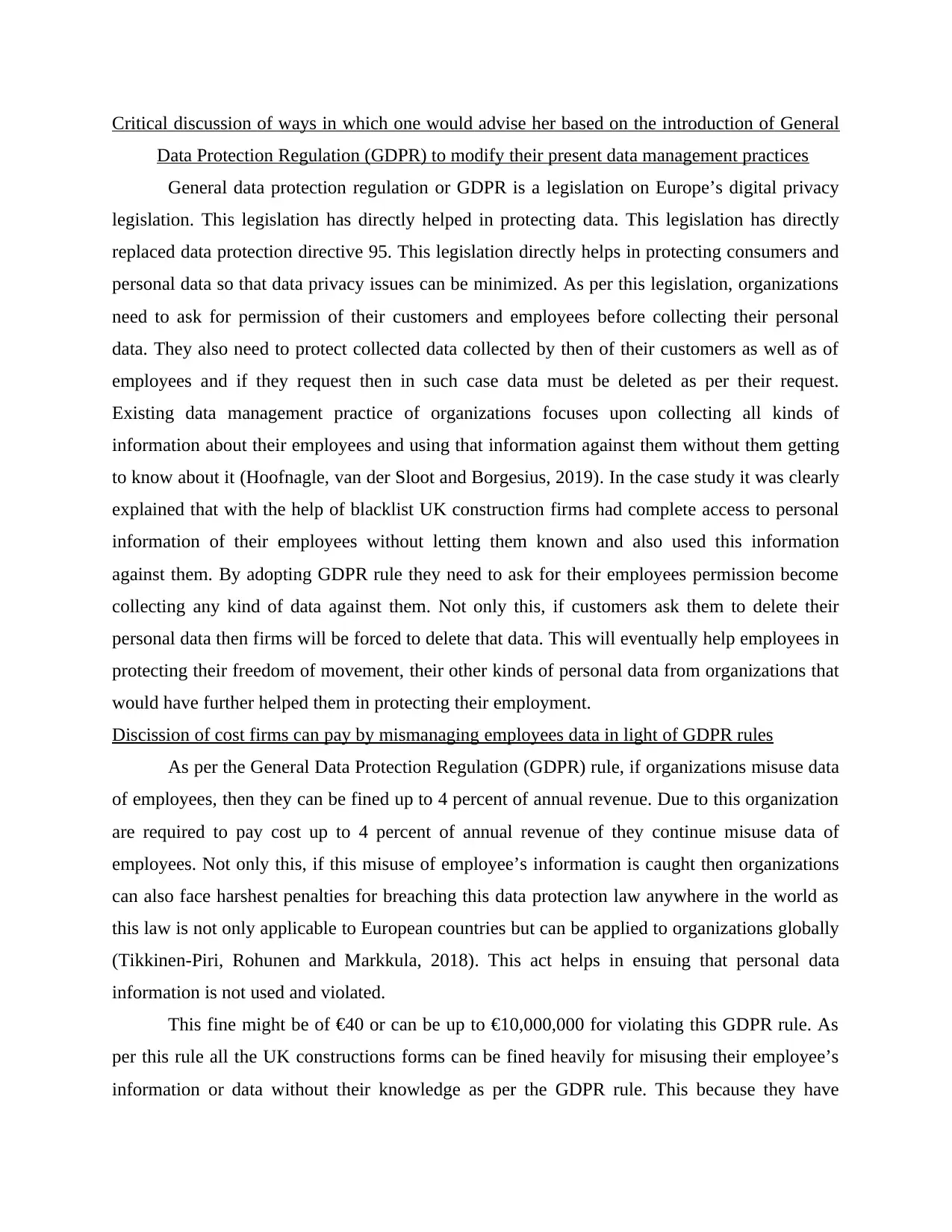
Critical discussion of ways in which one would advise her based on the introduction of General
Data Protection Regulation (GDPR) to modify their present data management practices
General data protection regulation or GDPR is a legislation on Europe’s digital privacy
legislation. This legislation has directly helped in protecting data. This legislation has directly
replaced data protection directive 95. This legislation directly helps in protecting consumers and
personal data so that data privacy issues can be minimized. As per this legislation, organizations
need to ask for permission of their customers and employees before collecting their personal
data. They also need to protect collected data collected by then of their customers as well as of
employees and if they request then in such case data must be deleted as per their request.
Existing data management practice of organizations focuses upon collecting all kinds of
information about their employees and using that information against them without them getting
to know about it (Hoofnagle, van der Sloot and Borgesius, 2019). In the case study it was clearly
explained that with the help of blacklist UK construction firms had complete access to personal
information of their employees without letting them known and also used this information
against them. By adopting GDPR rule they need to ask for their employees permission become
collecting any kind of data against them. Not only this, if customers ask them to delete their
personal data then firms will be forced to delete that data. This will eventually help employees in
protecting their freedom of movement, their other kinds of personal data from organizations that
would have further helped them in protecting their employment.
Discission of cost firms can pay by mismanaging employees data in light of GDPR rules
As per the General Data Protection Regulation (GDPR) rule, if organizations misuse data
of employees, then they can be fined up to 4 percent of annual revenue. Due to this organization
are required to pay cost up to 4 percent of annual revenue of they continue misuse data of
employees. Not only this, if this misuse of employee’s information is caught then organizations
can also face harshest penalties for breaching this data protection law anywhere in the world as
this law is not only applicable to European countries but can be applied to organizations globally
(Tikkinen-Piri, Rohunen and Markkula, 2018). This act helps in ensuing that personal data
information is not used and violated.
This fine might be of €40 or can be up to €10,000,000 for violating this GDPR rule. As
per this rule all the UK constructions forms can be fined heavily for misusing their employee’s
information or data without their knowledge as per the GDPR rule. This because they have
Data Protection Regulation (GDPR) to modify their present data management practices
General data protection regulation or GDPR is a legislation on Europe’s digital privacy
legislation. This legislation has directly helped in protecting data. This legislation has directly
replaced data protection directive 95. This legislation directly helps in protecting consumers and
personal data so that data privacy issues can be minimized. As per this legislation, organizations
need to ask for permission of their customers and employees before collecting their personal
data. They also need to protect collected data collected by then of their customers as well as of
employees and if they request then in such case data must be deleted as per their request.
Existing data management practice of organizations focuses upon collecting all kinds of
information about their employees and using that information against them without them getting
to know about it (Hoofnagle, van der Sloot and Borgesius, 2019). In the case study it was clearly
explained that with the help of blacklist UK construction firms had complete access to personal
information of their employees without letting them known and also used this information
against them. By adopting GDPR rule they need to ask for their employees permission become
collecting any kind of data against them. Not only this, if customers ask them to delete their
personal data then firms will be forced to delete that data. This will eventually help employees in
protecting their freedom of movement, their other kinds of personal data from organizations that
would have further helped them in protecting their employment.
Discission of cost firms can pay by mismanaging employees data in light of GDPR rules
As per the General Data Protection Regulation (GDPR) rule, if organizations misuse data
of employees, then they can be fined up to 4 percent of annual revenue. Due to this organization
are required to pay cost up to 4 percent of annual revenue of they continue misuse data of
employees. Not only this, if this misuse of employee’s information is caught then organizations
can also face harshest penalties for breaching this data protection law anywhere in the world as
this law is not only applicable to European countries but can be applied to organizations globally
(Tikkinen-Piri, Rohunen and Markkula, 2018). This act helps in ensuing that personal data
information is not used and violated.
This fine might be of €40 or can be up to €10,000,000 for violating this GDPR rule. As
per this rule all the UK constructions forms can be fined heavily for misusing their employee’s
information or data without their knowledge as per the GDPR rule. This because they have
⊘ This is a preview!⊘
Do you want full access?
Subscribe today to unlock all pages.

Trusted by 1+ million students worldwide
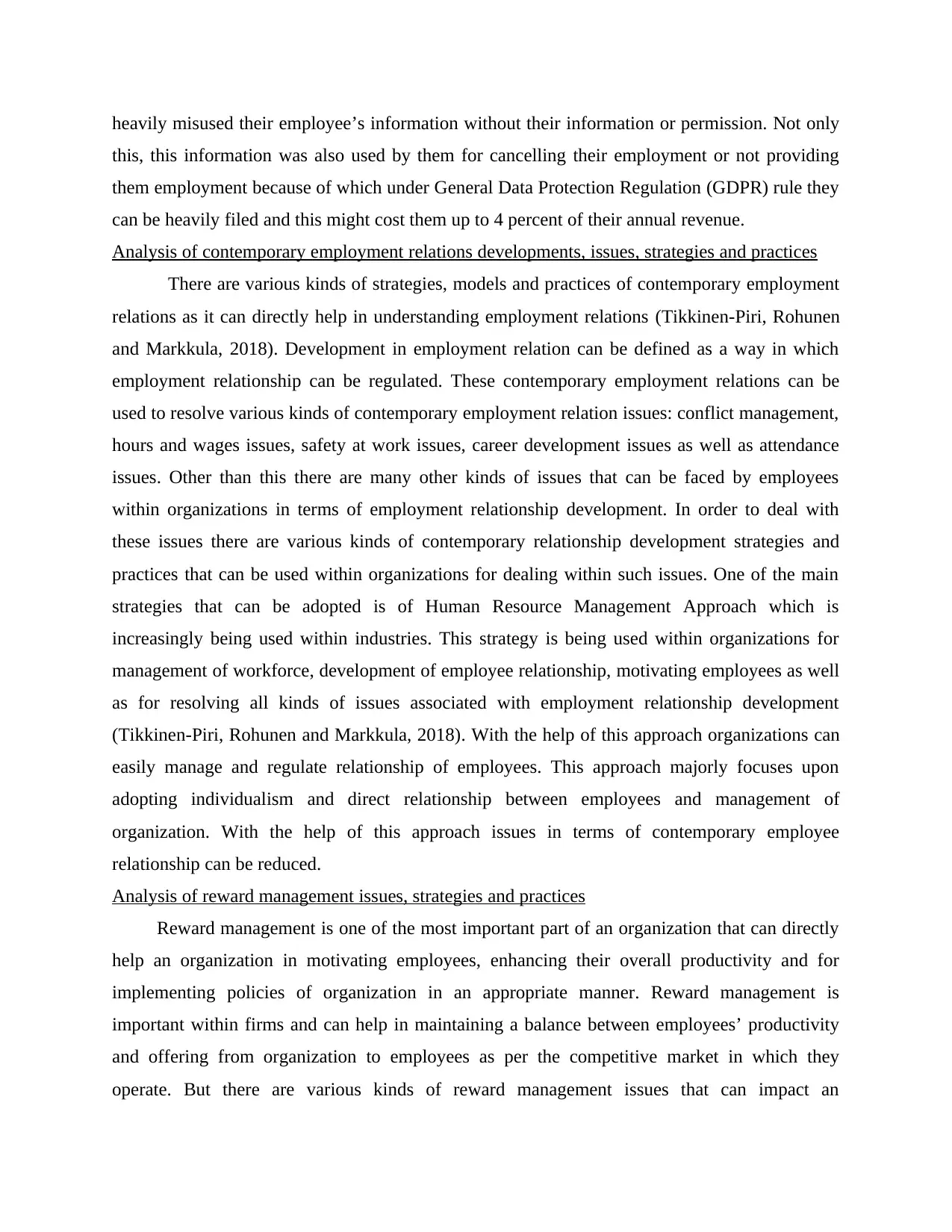
heavily misused their employee’s information without their information or permission. Not only
this, this information was also used by them for cancelling their employment or not providing
them employment because of which under General Data Protection Regulation (GDPR) rule they
can be heavily filed and this might cost them up to 4 percent of their annual revenue.
Analysis of contemporary employment relations developments, issues, strategies and practices
There are various kinds of strategies, models and practices of contemporary employment
relations as it can directly help in understanding employment relations (Tikkinen-Piri, Rohunen
and Markkula, 2018). Development in employment relation can be defined as a way in which
employment relationship can be regulated. These contemporary employment relations can be
used to resolve various kinds of contemporary employment relation issues: conflict management,
hours and wages issues, safety at work issues, career development issues as well as attendance
issues. Other than this there are many other kinds of issues that can be faced by employees
within organizations in terms of employment relationship development. In order to deal with
these issues there are various kinds of contemporary relationship development strategies and
practices that can be used within organizations for dealing within such issues. One of the main
strategies that can be adopted is of Human Resource Management Approach which is
increasingly being used within industries. This strategy is being used within organizations for
management of workforce, development of employee relationship, motivating employees as well
as for resolving all kinds of issues associated with employment relationship development
(Tikkinen-Piri, Rohunen and Markkula, 2018). With the help of this approach organizations can
easily manage and regulate relationship of employees. This approach majorly focuses upon
adopting individualism and direct relationship between employees and management of
organization. With the help of this approach issues in terms of contemporary employee
relationship can be reduced.
Analysis of reward management issues, strategies and practices
Reward management is one of the most important part of an organization that can directly
help an organization in motivating employees, enhancing their overall productivity and for
implementing policies of organization in an appropriate manner. Reward management is
important within firms and can help in maintaining a balance between employees’ productivity
and offering from organization to employees as per the competitive market in which they
operate. But there are various kinds of reward management issues that can impact an
this, this information was also used by them for cancelling their employment or not providing
them employment because of which under General Data Protection Regulation (GDPR) rule they
can be heavily filed and this might cost them up to 4 percent of their annual revenue.
Analysis of contemporary employment relations developments, issues, strategies and practices
There are various kinds of strategies, models and practices of contemporary employment
relations as it can directly help in understanding employment relations (Tikkinen-Piri, Rohunen
and Markkula, 2018). Development in employment relation can be defined as a way in which
employment relationship can be regulated. These contemporary employment relations can be
used to resolve various kinds of contemporary employment relation issues: conflict management,
hours and wages issues, safety at work issues, career development issues as well as attendance
issues. Other than this there are many other kinds of issues that can be faced by employees
within organizations in terms of employment relationship development. In order to deal with
these issues there are various kinds of contemporary relationship development strategies and
practices that can be used within organizations for dealing within such issues. One of the main
strategies that can be adopted is of Human Resource Management Approach which is
increasingly being used within industries. This strategy is being used within organizations for
management of workforce, development of employee relationship, motivating employees as well
as for resolving all kinds of issues associated with employment relationship development
(Tikkinen-Piri, Rohunen and Markkula, 2018). With the help of this approach organizations can
easily manage and regulate relationship of employees. This approach majorly focuses upon
adopting individualism and direct relationship between employees and management of
organization. With the help of this approach issues in terms of contemporary employee
relationship can be reduced.
Analysis of reward management issues, strategies and practices
Reward management is one of the most important part of an organization that can directly
help an organization in motivating employees, enhancing their overall productivity and for
implementing policies of organization in an appropriate manner. Reward management is
important within firms and can help in maintaining a balance between employees’ productivity
and offering from organization to employees as per the competitive market in which they
operate. But there are various kinds of reward management issues that can impact an
Paraphrase This Document
Need a fresh take? Get an instant paraphrase of this document with our AI Paraphraser
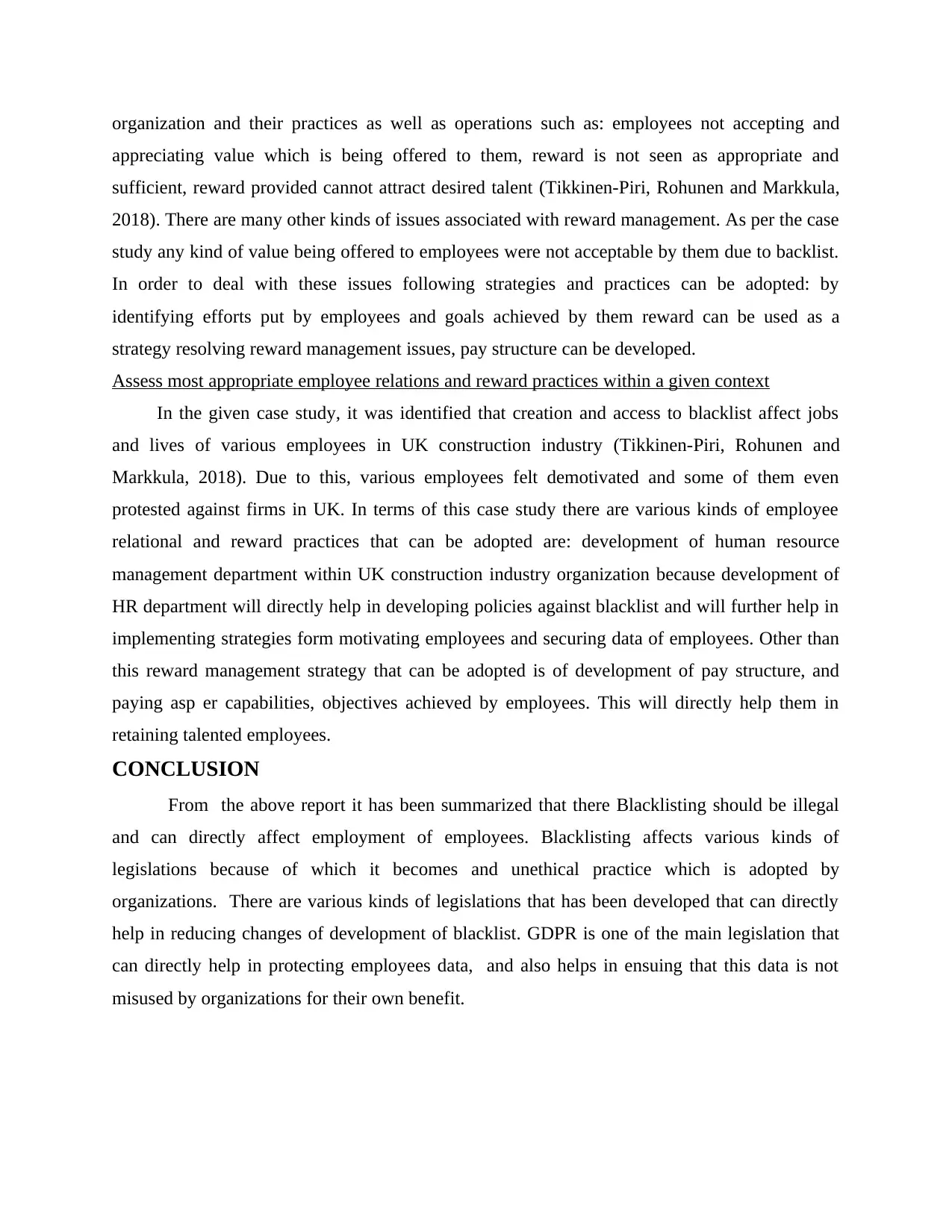
organization and their practices as well as operations such as: employees not accepting and
appreciating value which is being offered to them, reward is not seen as appropriate and
sufficient, reward provided cannot attract desired talent (Tikkinen-Piri, Rohunen and Markkula,
2018). There are many other kinds of issues associated with reward management. As per the case
study any kind of value being offered to employees were not acceptable by them due to backlist.
In order to deal with these issues following strategies and practices can be adopted: by
identifying efforts put by employees and goals achieved by them reward can be used as a
strategy resolving reward management issues, pay structure can be developed.
Assess most appropriate employee relations and reward practices within a given context
In the given case study, it was identified that creation and access to blacklist affect jobs
and lives of various employees in UK construction industry (Tikkinen-Piri, Rohunen and
Markkula, 2018). Due to this, various employees felt demotivated and some of them even
protested against firms in UK. In terms of this case study there are various kinds of employee
relational and reward practices that can be adopted are: development of human resource
management department within UK construction industry organization because development of
HR department will directly help in developing policies against blacklist and will further help in
implementing strategies form motivating employees and securing data of employees. Other than
this reward management strategy that can be adopted is of development of pay structure, and
paying asp er capabilities, objectives achieved by employees. This will directly help them in
retaining talented employees.
CONCLUSION
From the above report it has been summarized that there Blacklisting should be illegal
and can directly affect employment of employees. Blacklisting affects various kinds of
legislations because of which it becomes and unethical practice which is adopted by
organizations. There are various kinds of legislations that has been developed that can directly
help in reducing changes of development of blacklist. GDPR is one of the main legislation that
can directly help in protecting employees data, and also helps in ensuing that this data is not
misused by organizations for their own benefit.
appreciating value which is being offered to them, reward is not seen as appropriate and
sufficient, reward provided cannot attract desired talent (Tikkinen-Piri, Rohunen and Markkula,
2018). There are many other kinds of issues associated with reward management. As per the case
study any kind of value being offered to employees were not acceptable by them due to backlist.
In order to deal with these issues following strategies and practices can be adopted: by
identifying efforts put by employees and goals achieved by them reward can be used as a
strategy resolving reward management issues, pay structure can be developed.
Assess most appropriate employee relations and reward practices within a given context
In the given case study, it was identified that creation and access to blacklist affect jobs
and lives of various employees in UK construction industry (Tikkinen-Piri, Rohunen and
Markkula, 2018). Due to this, various employees felt demotivated and some of them even
protested against firms in UK. In terms of this case study there are various kinds of employee
relational and reward practices that can be adopted are: development of human resource
management department within UK construction industry organization because development of
HR department will directly help in developing policies against blacklist and will further help in
implementing strategies form motivating employees and securing data of employees. Other than
this reward management strategy that can be adopted is of development of pay structure, and
paying asp er capabilities, objectives achieved by employees. This will directly help them in
retaining talented employees.
CONCLUSION
From the above report it has been summarized that there Blacklisting should be illegal
and can directly affect employment of employees. Blacklisting affects various kinds of
legislations because of which it becomes and unethical practice which is adopted by
organizations. There are various kinds of legislations that has been developed that can directly
help in reducing changes of development of blacklist. GDPR is one of the main legislation that
can directly help in protecting employees data, and also helps in ensuing that this data is not
misused by organizations for their own benefit.

⊘ This is a preview!⊘
Do you want full access?
Subscribe today to unlock all pages.

Trusted by 1+ million students worldwide
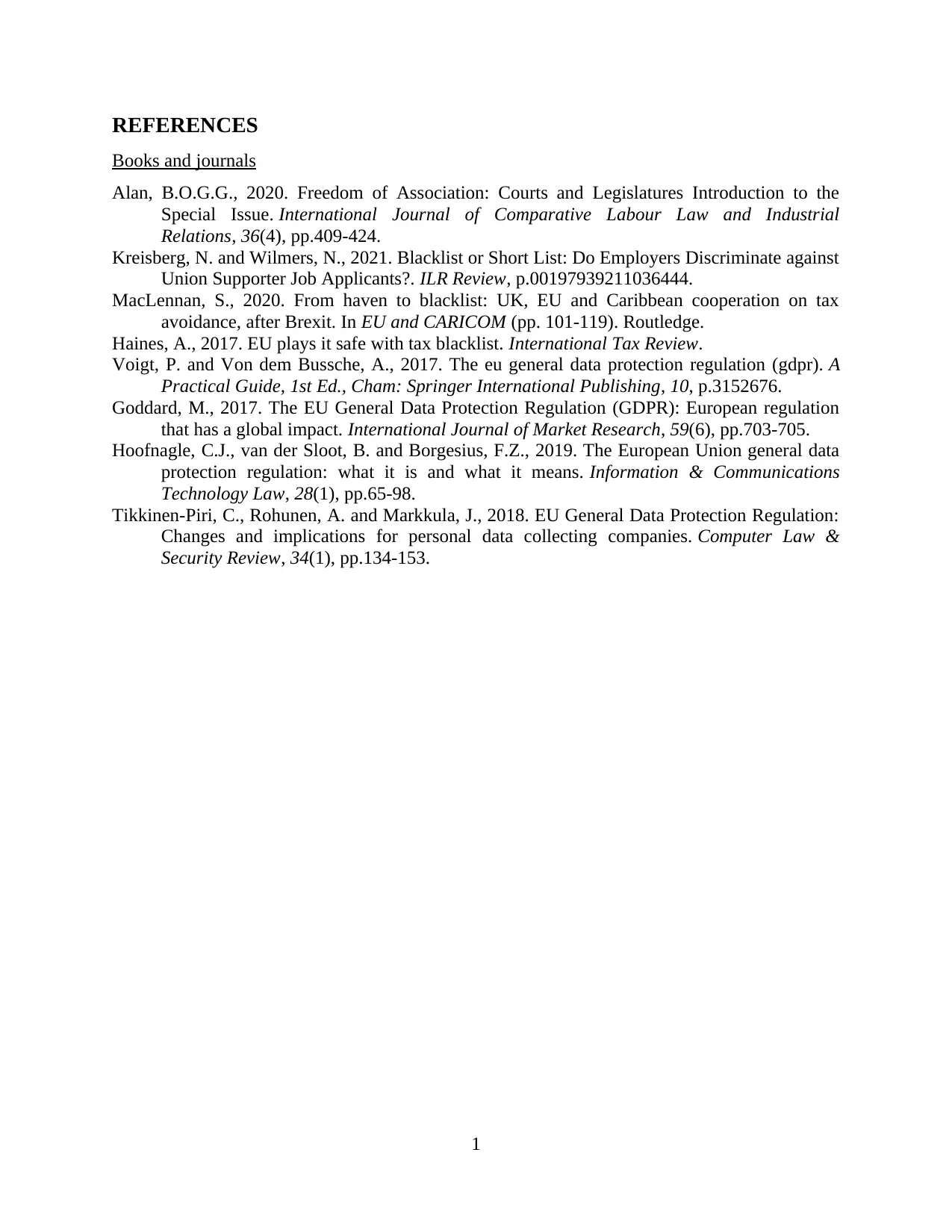
REFERENCES
Books and journals
Alan, B.O.G.G., 2020. Freedom of Association: Courts and Legislatures Introduction to the
Special Issue. International Journal of Comparative Labour Law and Industrial
Relations, 36(4), pp.409-424.
Kreisberg, N. and Wilmers, N., 2021. Blacklist or Short List: Do Employers Discriminate against
Union Supporter Job Applicants?. ILR Review, p.00197939211036444.
MacLennan, S., 2020. From haven to blacklist: UK, EU and Caribbean cooperation on tax
avoidance, after Brexit. In EU and CARICOM (pp. 101-119). Routledge.
Haines, A., 2017. EU plays it safe with tax blacklist. International Tax Review.
Voigt, P. and Von dem Bussche, A., 2017. The eu general data protection regulation (gdpr). A
Practical Guide, 1st Ed., Cham: Springer International Publishing, 10, p.3152676.
Goddard, M., 2017. The EU General Data Protection Regulation (GDPR): European regulation
that has a global impact. International Journal of Market Research, 59(6), pp.703-705.
Hoofnagle, C.J., van der Sloot, B. and Borgesius, F.Z., 2019. The European Union general data
protection regulation: what it is and what it means. Information & Communications
Technology Law, 28(1), pp.65-98.
Tikkinen-Piri, C., Rohunen, A. and Markkula, J., 2018. EU General Data Protection Regulation:
Changes and implications for personal data collecting companies. Computer Law &
Security Review, 34(1), pp.134-153.
1
Books and journals
Alan, B.O.G.G., 2020. Freedom of Association: Courts and Legislatures Introduction to the
Special Issue. International Journal of Comparative Labour Law and Industrial
Relations, 36(4), pp.409-424.
Kreisberg, N. and Wilmers, N., 2021. Blacklist or Short List: Do Employers Discriminate against
Union Supporter Job Applicants?. ILR Review, p.00197939211036444.
MacLennan, S., 2020. From haven to blacklist: UK, EU and Caribbean cooperation on tax
avoidance, after Brexit. In EU and CARICOM (pp. 101-119). Routledge.
Haines, A., 2017. EU plays it safe with tax blacklist. International Tax Review.
Voigt, P. and Von dem Bussche, A., 2017. The eu general data protection regulation (gdpr). A
Practical Guide, 1st Ed., Cham: Springer International Publishing, 10, p.3152676.
Goddard, M., 2017. The EU General Data Protection Regulation (GDPR): European regulation
that has a global impact. International Journal of Market Research, 59(6), pp.703-705.
Hoofnagle, C.J., van der Sloot, B. and Borgesius, F.Z., 2019. The European Union general data
protection regulation: what it is and what it means. Information & Communications
Technology Law, 28(1), pp.65-98.
Tikkinen-Piri, C., Rohunen, A. and Markkula, J., 2018. EU General Data Protection Regulation:
Changes and implications for personal data collecting companies. Computer Law &
Security Review, 34(1), pp.134-153.
1
1 out of 10
Related Documents
Your All-in-One AI-Powered Toolkit for Academic Success.
+13062052269
info@desklib.com
Available 24*7 on WhatsApp / Email
![[object Object]](/_next/static/media/star-bottom.7253800d.svg)
Unlock your academic potential
Copyright © 2020–2026 A2Z Services. All Rights Reserved. Developed and managed by ZUCOL.


